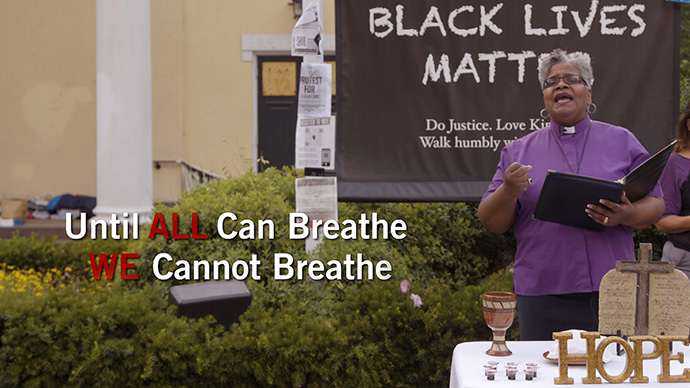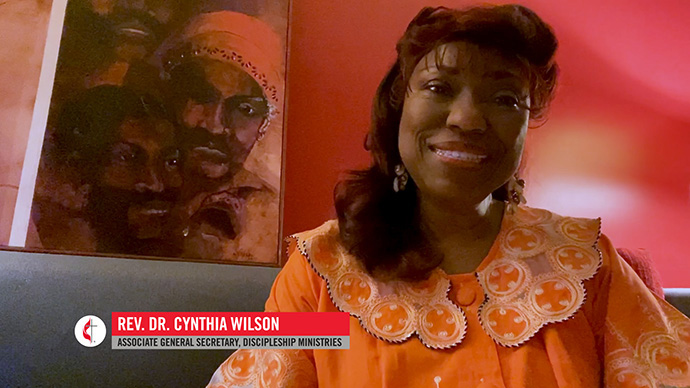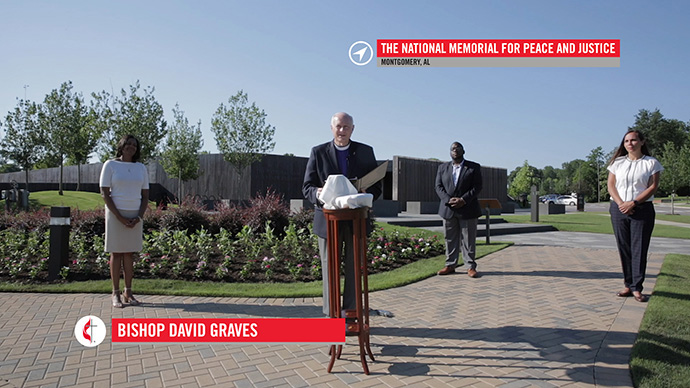An unflinching, hour-long “Service of Lament, Repentance, Communion and Commitment” went online June 24, putting The United Methodist Church on record as committed to a renewed push against racism.
“The Council of Bishops and every church agency within our denomination are working together as never before because this call from God and outcry from our troubled world are so urgent,” says East Ohio Conference Bishop Tracy Malone during the video service. “We are acting and moving.”
Pulled together in under two weeks despite the COVID-19 pandemic — with footage contributed from 25 different locations — the video features prayer, Scripture and anguished testimony from United Methodists of color.
Woven throughout are spirituals and protest hymns sung with spare or no accompaniment, as well as photos of demonstrations and victims of racial violence.
The service builds toward communion, led by bishops in four locations, with liturgy incorporating the “I can’t breathe” plea of George Floyd as he was dying in a police chokehold in Minneapolis, as well as the words “Black Lives Matter.”

In the service, white bishops speak plainly about white privilege.
“We must pray that God will open our eyes to how we benefit directly from racism and how we might be part of the dismantling and healing that must be done,” New York Conference Bishop Thomas Bickerton says.
Church leaders used Juneteenth — the June 19 celebration of the end of U.S. slavery — to announce the launch of an initiative called Dismantling Racism: Pressing on to Freedom.
Spurred by the Floyd killing and other high-profile deaths of African-Americans at police officers’ hands, the Council of Bishops and general church agency leaders promised a new denominational commitment to racial justice.
The June 24 service was a first major online gathering for the initiative.
Erin Hawkins, top executive of the United Methodist Commission on Religion and Race, said she and others planning the service wanted it to be an uncomfortably candid grappling with racism, including inside the church.
“All of our hearts need to be broken a bit, so that the passion, love and justice contained within them can flow out,” Hawkins said by phone.

The Rev. Cynthia Wilson, worship resources executive for United Methodist Discipleship Ministries, coordinated the team designing the service. She joined Hawkins and other leaders in believing the anti-racism effort had to be grounded in worship, with an appeal to God for forgiveness and help.
“I think we’ve forgotten how to cry out to God,” Wilson said. “It’s time for us to remember. As the Ecclesiastes text reminds us, there are seasons for weeping and crying out in mourning.”
The service begins with legendary singer Odetta’s recording of “Sometimes I Feel Like a Motherless Child.” Other spirituals are employed, but also footage of the Rev. R. DeAndre Johnson, of Christ United Methodist Church in Sugar Land, Texas, singing a recent protest hymn he wrote that has found broad viewership on YouTube.
The service features testimonies about racism from a diverse group of United Methodist witnesses, including Valerie Boyer, who as a young African American speaks of loving the denomination but also experiencing its failures.
“I need my church to say something, starting with the basics, like saying their names,” she says, meaning the victims of racial violence.
Boyer also calls for attention to the 8 minutes and 46 seconds that Floyd was in a lethal chokehold. Later in the service that length of time is observed in silence, while quotations from civil and human rights leaders and others, including Methodism founder John Wesley, flash on the screen.

For the communion segment, Baltimore-Washington Conference Bishop LaTrelle Easterling stands in front of a Black Lives Matter banner by St. John’s Episcopal Church in Washington’s Lafayette Square. California-Pacific Conference Bishop Grant Hagiya in Los Angeles, Dakotas-Minnesota Area Bishop Bruce Ough in Minneapolis and Alabama-West Florida Conference Bishop David Graves at the National Memorial for Peace and Justice in Montgomery, Alabama, join her in officiating.
The pandemic reality is clear not just from their remote locations, but from Easterling encouraging viewers to decide for themselves whether they want to participate in online communion — a source of controversy and varying instruction from bishops.
Council of Bishops President Cynthia Harvey is among those offering prayers in the service, and she quotes from one given by Bishop Woodie White at the 1996 General Conference. It begins:
Subscribe to our
e-newsletter
“May the Lord continue to torment you. May the Lord keep before you the faces of the hungry, the lonely, the rejected and the despised. May the Lord afflict you with pain for the hurt, the wounded, the oppressed, the abused, the victims of violence.”
The service will remain accessible on various denominational websites, giving churches and other groups a chance to share it across the denomination and beyond.
The Rev. Theon Johnson III, pastor of Downs Memorial United Methodist Church in Oakland, California, is among those in the service, having used his smartphone to video himself reading Scripture.
He said in a phone interview that he was glad to help but will be looking for follow-up on a big scale.
“We can’t afford in this moment to approach the injustice of racism as an island unto itself,” he said. “Injustice breeds injustice. Injustice is one big ol’ family and dismantling racism also requires us to reckon with other ‘isms’ that oppress God’s children.”
Hodges is a Dallas-based writer for United Methodist News. Contact him at 615-742-5470 or newsdesk@umcom.org. To read more United Methodist news, subscribe to the free Daily or Weekly Digests.
Like what you're reading? Support the ministry of UM News! Your support ensures the latest denominational news, dynamic stories and informative articles will continue to connect our global community. Make a tax-deductible donation at ResourceUMC.org/GiveUMCom.



